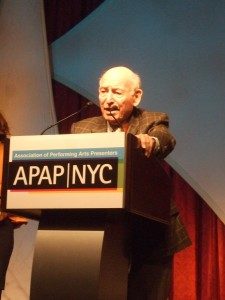Music festival impresario George Wein, founder of the Newport Folk & Jazz Festivals and the New Orleans Jazz and Heritage Festival, died September 13 in his New York City apartment. The noted pianist, producer and promoter was 95.
A pioneer among producers of outdoor music festivals, Wein (pronounced WEEN) created the renowned Newport Jazz Festival in 1954 and the Newport Folk Festival, which has been held in or near the coastal Rhode Island resort city since 1959.
The Newport Folk Festival has featured a wide array of established and emerging artists over the years and helped to launch the careers of such artists as Joan Baez and Bob Dylan during the 1960s. Pete Seeger was among the folk luminaries who backed Wein when he launched the Newport Folk Festival. “Working with Pete has been one of the joys of my life and it’s influenced me in my relationships with people and artists in general,” Wein told AcousticMusicScene.com in 2012. “It’s because of that that I became deeply involved with the traditions of folk music.” However, Wein never felt constrained to just book artists whose music neatly fit into the “folk” genre; Dylan’s electrifying performance at the festival in 1965 shocked folk purists.
Born on October 3, 1925 in Lynn, Massachusetts, Wein grew up in Newton, near Boston. An accomplished jazz pianist, who led his own band for a while, Wein, nevertheless, opted to focus his career on presenting music — rather than performing it. A former Boston jazz club (Storyville and Mahogany Hall) and record label owner, artist manager, music columnist and, in later years, an executive board member of Jazz at Lincoln Center, Wein also wrote Myself Among Others: A Life in Music (Da Capo Press, 2003), an autobiography that has become a major reference on jazz history. Within its pages he noted that “the thing that has given me the most gratification in my life” was the acceptance that he received as a player himself from such jazz luminaries as Lester Young and Sidney Bechet.
“Jazz came out of a folk tradition, although they [jazz and folk music] went in different directions as years went by,” said Wein during that January 2012 interview with AcousticMusicScene.com. He noted that the relationship between the two was the impetus behind the popular New Orleans Jazz and Heritage Festival that he created in 1970.

George Wein was honored during the 2012 APAP Conference in New York City. (Photo: Steve Ramm)

Like/Follow Us!